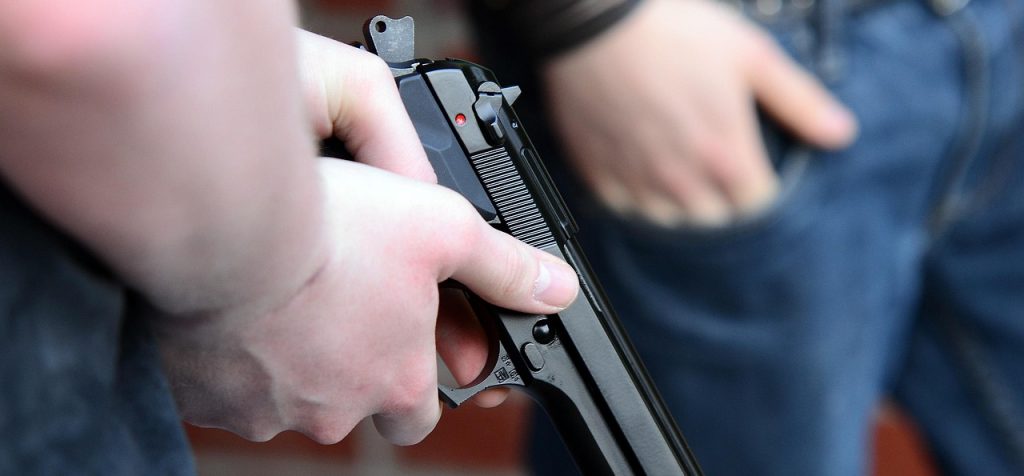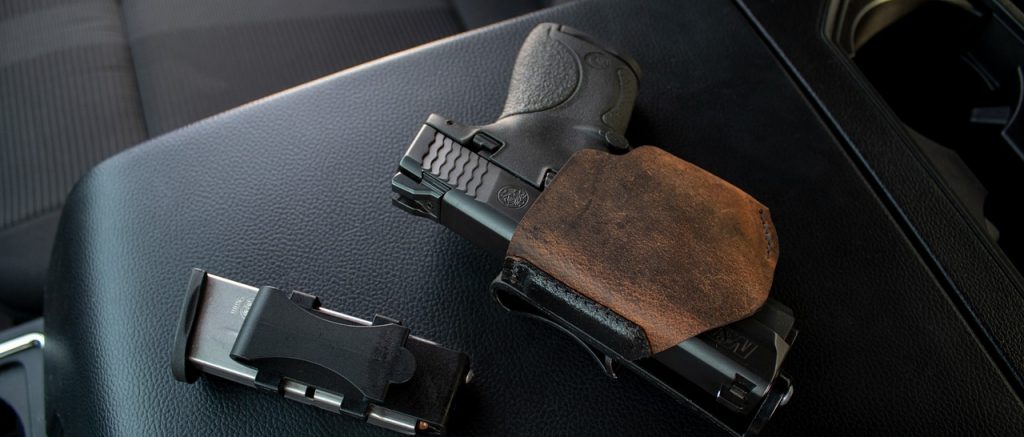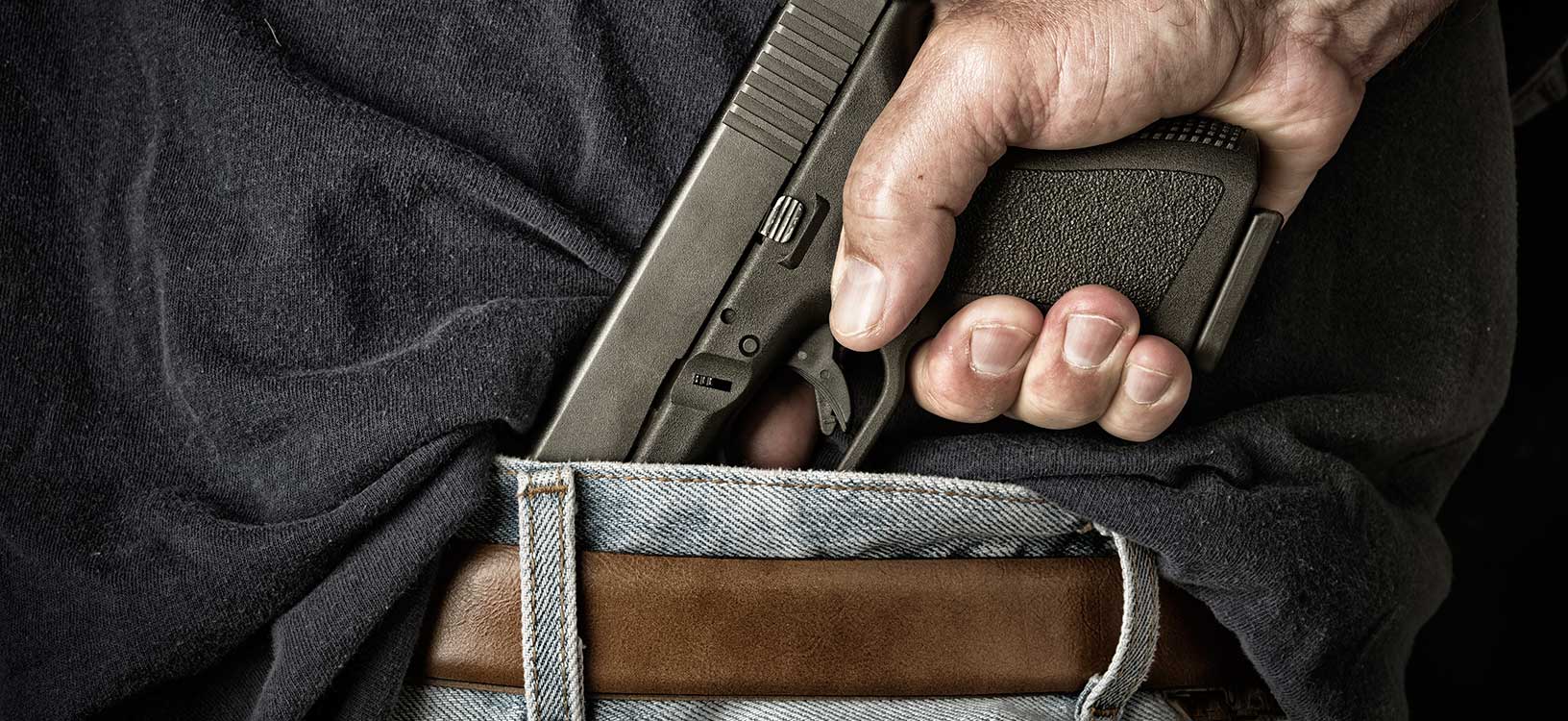Possession of a Firearm in the Commission of a Felony
In Michigan, individuals accused of possessing a firearm while committing a felony may face “Felony Firearm” charges, mandatory consecutive prison time, and additional penalties.

Felony Firearm Charges in Michigan
A person who possesses a firearm when they commit or attempt to commit a felony is guilty of Felony Firearm and ordered to serve two (2) years in prison. A second conviction requires imprisonment for five (5) years. A third or subsequent conviction requires 10 years in prison. These high-stakes charges require the strongest possible defense from an experienced attorney.
Most crimes in Michigan have maximum sentences, and many have mandatory minimum terms of imprisonment. However, a felony firearm has neither a maximum nor a minimum term of imprisonment; instead, it has a flat term of imprisonment that must be served consecutively to any other imprisonment sentence.
Federal Charges
The United States government charges felony firearms charges as well, and the federal firearms statute requires mandatory prison time as well. For federal drug and violation crimes, the penalties are as follows:
- shall be sentenced to a minimum of five (5) years or more,
- if brandished (shown), a minimum of seven (7) years or more,
- if discharged (fired), a minimum of 10.
Unlike Michigan law, federal law distinguishes between the type of gun used in violent or drug-related crimes to determine the minimum prison sentence that must be imposed:
- Possessing a short-barreled rifle or shotgun or a semi-automatic assault weapon when committing a violent crime or drug crime brings a minimum consecutive prison sentence of 10 years.
- Possessing a machine gun, destructive device, or a firearm silencer during the crime carries a mandatory minimum of 30 years in federal prison.

Frequently Asked Questions
What is a flat sentence?
A flat sentence is a sentence that the defendant must serve in its entirety and for the specific length ordered. A person cannot serve less or more than a flat sentence. For example, if the judge orders someone to serve a 2-year flat sentence, they will serve not more nor less than two (2) years.
What is a consecutive sentence?
When a judge sentences a defendant to jail or prison on multiple convictions, they must serve the sentences concurrently or consecutively. The defendant serves concurrent sentences at the same time. Consecutive jail or prison sentences follow one another. For example, suppose the judge orders a defendant to serve two concurrent one-year sentences; they do both sentences at the same time. Hence, they are in jail or prison for only one year in total. Conversely, if the sentences are consecutive, the person would fully serve the first sentence before starting the second felony sentence. As a result, they would serve one year plus one year, totaling two years.
Can a judge order a concurrent Felony Firearm sentence?
No, a judge cannot sentence a defendant to a concurrent term of imprisonment for Felony Firearm. Michigan law unambiguously requires a sentence on these charges to be served consecutively (one after the other).
Can a judge order a sentence of fewer than two years for Felony Firearm?
No, a judge cannot order a sentence of less than two years for a first conviction for Felony Firearm. The statute does not give a judge any discretion on sentencing. The mandatory sentence for a first conviction is two years. A second conviction requires five years. Any conviction after the second requires 10 years in prison.
Is a person eligible for parole?
No, a person is not eligible for parole while serving a sentence for this charge. A sentence must be served in its entirety. To the defendant’s benefit, they cannot be held in custody any longer than their sentence and do not have to qualify for parole. Once a person finishes their Felony Firearm sentence, they are released from prison (unless they have other unfulfilled sentences).
Can Felony Firearm charges be dismissed?
Yes, a prosecutor can dismiss charges as part of a plea bargain. In many cases, a savvy, experienced defense lawyer can negotiate with the prosecutor for a plea bargain requiring the dismissal of specific charges.
Can a person be convicted of Felony Firearm at trial when acquitted of all other charges?
Yes, a jury or judge can acquit a defendant of all charges except Felony Firearm. Although the outcome seems counterintuitive, appellate courts in Michigan have held that the judge or jury could find the defendant possessed a firearm during the commission of a felony that the defendant was acquitted of or not on trial for having committed.
If a person is convicted of multiple felony firearm convictions, do they serve each sentence consecutively?
No, multiple convictions do not have to be served consecutively. A person convicted of multiple counts will serve the sentences concurrently; however, they must be consecutive to the Felony Firearm sentences.
Is the sentence for Felony Firearm served consecutively to a misdemeanor jail sentence?
No, a Felony Firearm sentence is only consecutive to a felony jail or prison sentence. Misdemeanor sentences are concurrent.
Is the sentence served consecutively to a felony probation sentence?
No, a flat sentence for Felony Firearm is only consecutive to a felony sentence of incarceration. Probation terms are served concurrently. For example, a defendant can do two years in prison for the firearm charge and five (5) years on probation for other felony charges. When the individual is released from prison, they will remain on probation to their judge for three additional years.
Can a judge sentence someone to probation for Felony Firearm?
Unfortunately, probation is not a sentencing option. The only sentence available is a flat, consecutive prison sentence. Probation might become a sentencing option if an influential defense lawyer persuades a prosecutor to dismiss or agree to a reduced charge.

Felony Firearm Defenses
A top firearms defense attorney can use an imperfect defense as leverage to obtain a favorable plea bargain, or a defense can be suitable for a bench or jury trial. Examples of defenses that might apply include:
- Mistaken Identity
- Duress or Necessity
- Self-Defense
- Inoperability of Firearm
- Insufficient Evidence
- Lawful Possession
Even With Strong Evidence of Guilt, There is Still Hope
Facing a felony firearm charge in Michigan can feel overwhelming, especially when the prosecution has strong evidence. However, even in challenging cases, a highly skilled and influential defense attorney can make a significant difference. An experienced lawyer knows how to negotiate with prosecutors for reduced charges, alternative sentencing options, or even case dismissals in certain circumstances. Judges often trust the advocacy of well-respected attorneys, who can present compelling arguments for leniency, highlighting mitigating factors such as a lack of prior criminal

Firearm Defense Attorneys in Michigan
The attorneys with LEWIS & DICKSTEIN, P.L.L.C. have defended thousands of felony cases, including Felony Firearm charges in Michigan. We’ve obtained countless dismissals and successfully advocated for acquittals at trial. When mandatory, consecutive prison time is at stake, there is no room for lawyers to make errors and false promises. Call us for a free consultation. Our team stands ready to fight to protect and defend you. We will do whatever it takes to achieve the best possible result.
Call us today at (248) 263-6800 for a free consultation or complete an online Request for Assistance Form. We will contact you promptly and find a way to help you.












